While Mumbais privileged are happy that children can continue with on-screen education, students living in crammed spaces, jostling for phone time with family, say state needs to address their concerns
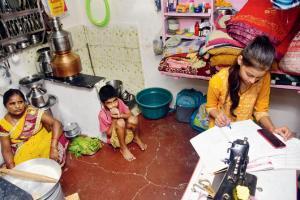
Poornima Pawan Gupta, a Class X student of Kherwadi Municipal School, says her father's tailoring table at their Bandra East home, doubles up as her study space. Pic/Shadab Khan
Given a go-ahead to open their gates to students tomorrow—eight months after the lockdown was announced to arrest the COVID-19 pandemic—Mumbai's schools will remain shut, at least until December 31, after a directive from the local civic body following a spike in daily cases.
Across the world, more than one billion students have been forced to stay outside the classroom since the pandemic started. However, of the 134 countries that shut schools, 105 had decided to open, as per a recent UNICEF report. As of August, 59 of these had already reopened their schools, including the two countries hardest hit by the pandemic—US and India. On November 2, Andhra Pradesh set in motion a phased reopening of schools to cover all the classes. But, in the week since, 829 teachers and at least 575 students tested positive, all from government high schools.
ADVERTISEMENT
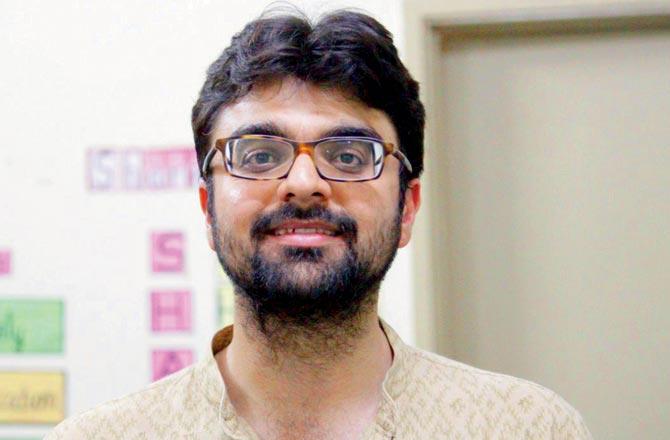
Saurabh Taneja, CEO of Akanksha Foundation
In this scenario, Shivnath Darade, secretary of the Mumbai Division of Maharashtra Teachers Association, says the decision to open schools in January 2021 should be taken only after assessing the situation then. "Teachers have been asked to get a COVID-19 test done independently. But, these arrangements should be made by the government instead. Staffers are scared for their lives. If a teacher travels from Kasara or Vasai in a local train to get to work, the chances of him or her contracting the infection and transmitting it are high," Darade adds.
While many will argue that online education is carrying on well, the experience isn't the same for those from less privileged economic backgrounds, argues Saurabh Taneja, CEO of Akanksha Foundation, a non-profit that works with the BMC schools. Taneja says one of the main tasks of the Foundation has been to ensure that all its students had a tablet at hand to continue their education. "For Class IX and X, we invested in 1,500 tablets. We are buying 1,000 more tablets so they can have access up to four hours of regular learning. Because if you are dependent on a parent's device, you cannot learn for more than an hour," he adds. Homes that were supportive of their kid's online engagement for four hours benefited from this model. "But, when you have a difficult home environment, especially for girls who are put into household chores, despite giving them tablets, there is only as much as they were able to participate in online learning. All our kids want to go back to schools."

Sanitising measures underway at the DY Patil International School in Worli. The school aims to open when the BMC issues a letter after December. Pic/Ashish Raje
Dr Lancelot Mark Pinto, consultant respirologist, PD Hinduja Hospital, says that prolonged closure of schools is not in the interest of students. "Keeping schools shut disproportionately affects children from the lower socio-economic strata. Government-run programmes that encourage parents to send their kids to school, like the mid-day meal, are critical for children from impoverished backgrounds. Keeping them away from school also means we deprive them of nutrition," he says.

Shivnath Darade, secretary, Mumbai Division of Maharashtra Teachers Assoc.
1,500
No. of tablets that Akanksha Foundation had to buy to facilitate online learning for its Class IX and X students
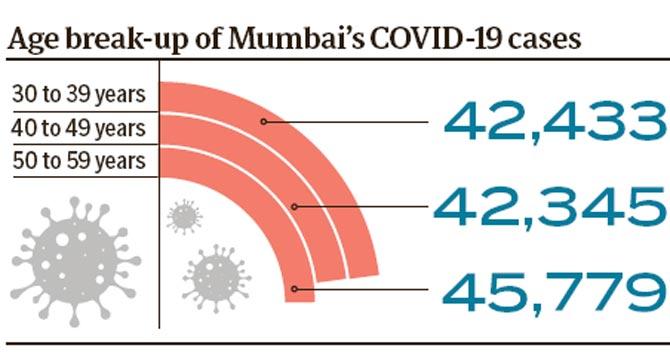
PRINCIPAL SPEAK
'We cannot deprive these students of class life any longer'
Kinnari Shah, principal, DY Patil International School, Worli

Kinnari Shah
Shah argues that the role of schools isn't limited to completing the syllabus alone. And so, in-person classes, interaction with teachers and other classmates is an important part of academic life that can't be foregone.
This school will soon conduct a survey, asking parents if they're comfortable sending their kids to class. Shah says, "Once we have 40 per cent consent from each grade, we will start welcoming kids. Since we want our kids to get their own devices to school to reduce reliability on closed computer labs, our IT team has upgraded the school's WiFi system. We have provided advanced laptops to our teachers, and have asked them to get a COVID-19 test two days prior to reopening of the school."
They plan to implement four-stage screening in the school, including temperature checks at the gate. There will also be a fogging station to ensure that anybody entering the campus is completely sanitised. Downloading the Arogya Setu app will be mandatory for teachers and students. There will be staggered entry timing for the administration staff, teachers and students.
"School is about more than opening a book and studying. It teaches you life skills. School is about having a chat with the teacher, sharing your tiffin with a friend, competing and running in the corridor. It is unfortunate that the kids had to be deprived of these experiences. Therefore, we are making it a point that they don't miss out on things that you and I enjoyed as kids," Shah adds.
DOCTOR SPEAK
'Kids can be silent spreaders'
Dr Nitin Shah, section head, paediatrics, PD Hinduja Hospital
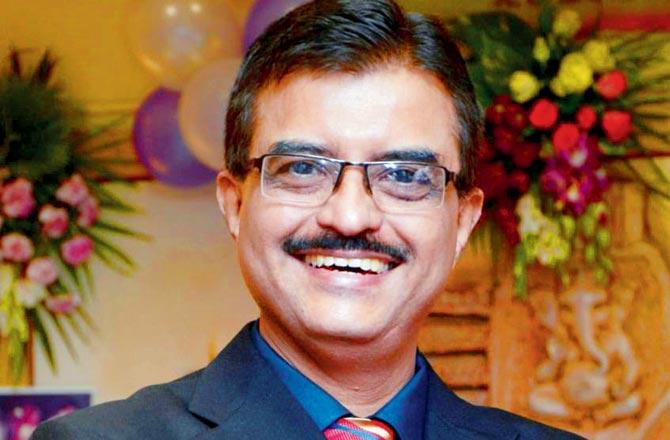
Dr Nitin Shah
It's not just the threat to children, but also the threat that they pose as asymptomatic carriers that's come to light in recent studies. Commentary from doctors at Children's National Hospital published in JAMA Pediatrics Trusted Source suggests that children can transmit the virus even if they never show symptoms or after symptoms have resolved.
Of 91 COVID-positive children across 22 facilities throughout South Korea, 20 never developed symptoms, 47 had unrecognised symptoms before their diagnosis, and 18 did not have symptoms until approximately 2.5 days after diagnosis. As a result, 42 per cent of the children were asymptomatic at the time of diagnosis, and 47 per cent were presymptomatic and later developed symptoms after about 2.5 days. Others had no symptoms during their entire illness.
Dr Nitin Shah, section head, paediatrics, PD Hinduja Hospital, says children are silent spreaders of the virus. "With kids stepping out of the protected environment of their homes, the real worry is that they will transmit the virus to their parents or grandparents. There could be a diabetic teacher, who could contract the virus from an asymptomatic kid. An elderly security guard may get it. So, reopening schools is most certainly a superspreader event," he warns.
10
Percentage of US COVID-19 cases occupied by those below the age of 18, as per AAP
575
Number of students in Andhra Pradesh who tested positive, after schools reopened on November 2
WHAT THE KIDS ARE THINKING
'Father's tailoring table is my study table'
Poornima Gupta, Class X, Kherwadi Municipal School, Bandra East
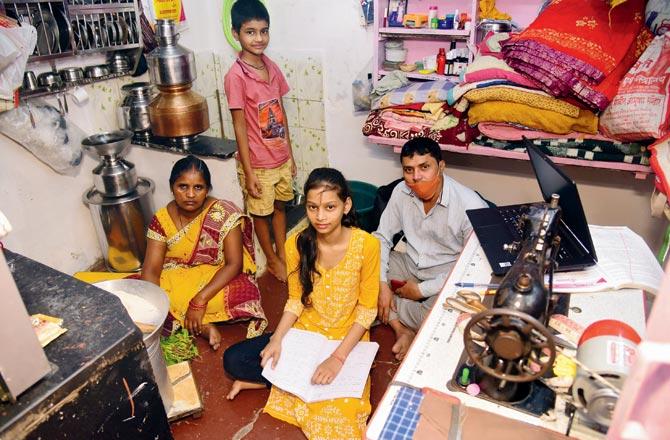
BMC school student Poornima Gupta lives with her father Pawan, mother Geeta and brother Yash in their home at Teacher's Colony, Bandra East. Pic/Shadab Khan
Online learning is not easy for us, especially with limited resources and access issues in the area. My father is a tailor; his tailoring table doubles up as my study table. Our board exams are coming up and I would really want to get back to school as it is easier to clear doubts and understand concepts in a live class. I understand the pandemic hasn't gone yet and I have seen it firsthand with my grandfather go through it, but I also know that our schools will take utmost care.
Besides, I feel it all depends on us—we are responsible for our own [family's hygiene and health]. We must ensure that we wear masks and carry our own sanitisers. I am not speaking for all schools in general, but people like us who do not have resources, need to get back to school and the government must step in and help make it safe and hygienic.
'What if we catch virus right before the exams?'
Vivaan Kothari, Class X, Aditya Birla World Academy
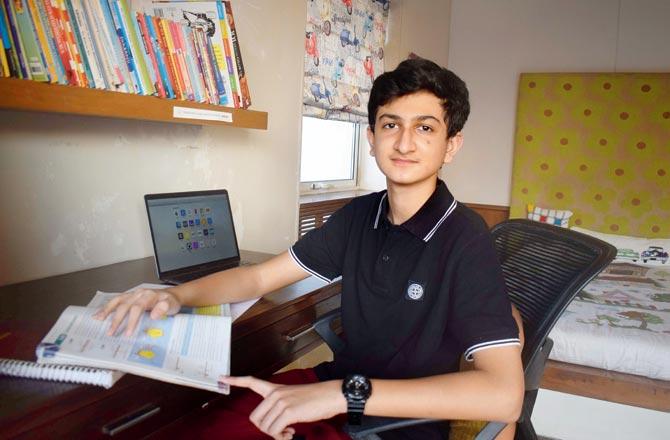
Vivaan Kothari at his Malabar Hill home. Pic/Ashish Raje
I feel online learning isn't as effective compared to classroom interaction as the attention span is reduced. Besides, since we are in Class X, and will have prelims and board exams soon, I think we can score better if we have access to the physical school. Additionally, this is our last year in school and most of us will move out to take up other colleges or streams. It would have been nice if we had time to spend with each other. I understand that parents will argue that safety comes first, but our school has assured us that all measures are being taken to ensure the health of students and teachers.
On the other hand, it is important for us to also think of our parents and grandparents. I have seen relatives suffer from the virus and, while they all have recovered, it sure can be a risky proposition. What if we catch the virus right before the exams? It could have a negative impact on our physical and mental health and would deter us from studying for the exam. While the numbers in the city are decreasing, there could be a second wave as well.
It would be better if the decision is deferred to mid-January.
'Confident of school's safety measures'
Kaimin Eduljee, Class X, Ava Bai Petit Girls High School
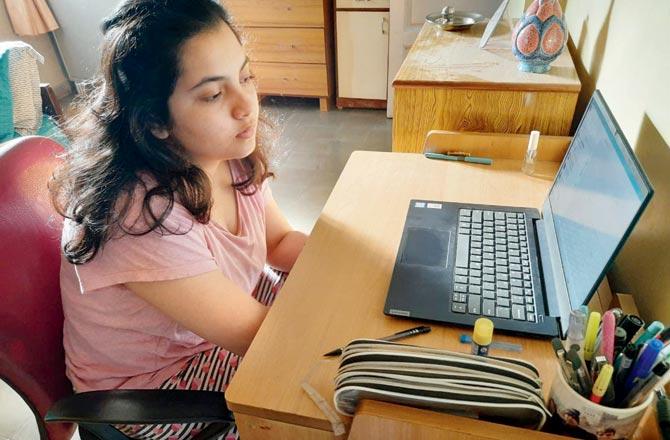
Kaimin Eduljee, Class X, Ava Bai Petit Girls High School
Online schools, with all their benefits, have limitations. The attention span is less, and staring at the screen for long can get extremely taxing, both physically and mentally. At school you have a breather, you have your friends around, it's a different environment that helps you understand better and grasp what's being taught at school easily. But, the numbers in the city are alarming. Having said that, I have confidence that the school will take all precautions. However, the last thing we want is to fall sick or be carriers. I am glad they made the decision to defer opening of schools till December 31. Now we won't have to worry.
Respirologist's advice
Dr Lancelot Mark Pinto, consultant respirologist, PD Hinduja Hospital and MRC

Temperature checks and downloading Arogya Setu app will be mandatory for anyone who enters the DY Patil International School premises in Worli. Pic/Ashish Raje
Have good ventilation, keep the windows and doors open, try and have good air exchange in the rooms, any feasible engineering to improve ventilation would be very useful. Distance the kids in the classroom as much as possible, even though it may have its limitations. Measures such as simple hand sanitising and wearing masks are important, especially when students are sitting in close proximity with each other. Temperature checks at entry point of the school should be useful and parents should be strongly encouraged to keep ill children at home. Teachers should supervise.
How the world is handling reopening of schools
SRI LANKA No surge after reopening
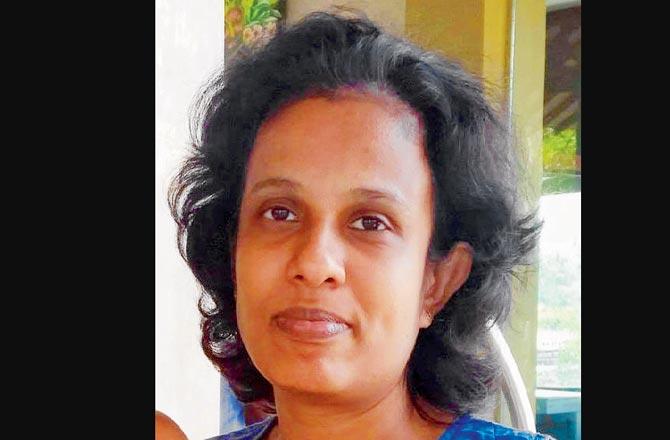
Dr Ruwandi Ranasinghe
In August, Sri Lanka fully reopened schools after keeping them closed for over four months. As of November 13, the country has recorded only 15,723 total Coronavirus cases, of which 11,031 have recovered and 48 succumbed. Dr Ruwandi Ranasinghe, scientific officer in DNA sequencing, University of Colombo, says, "There was still no hurry to open schools here. We could have waited for a vaccine to come. My kid is in Class III and, at his school, temperature checks are mandatory. But I still wish we could continue with online learning for a few more months," Dr Ranasinghe feels.
The only reason why the region may have opened schools is for advanced level exams for Class XIII students. "These exams are crucial and I think that is why the government must have decided this. There has been no surge fortunately and the model has seen 90 per cent success. But, it has just been 1.5 months since schools were reopened for all grades. Things could turn south, you never know," she thinks.
SWEDEN Closure of schools only after alternate arrangements for kids
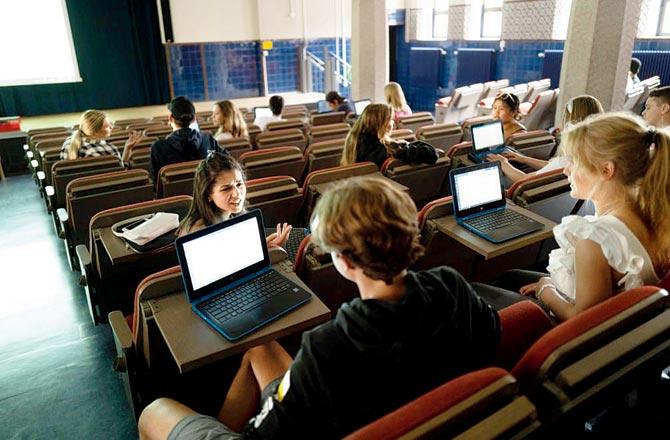
Students, advised to respect social distancing rules, attend history class on the first day back to school since the March shut down, on August 21 in Stockholm, Sweden. Pic/Getty Images
Sweden stands out as one country that didn't shut down its schools. The Public Health Agency in Sweden tells mid-day that they do not consider it necessary to close all schools as there is no scientific evidence indicating that such an intervention would have a significant impact on the pandemic, nor has any major transmission of COVID-19 in schools been reported. The office says, "Closing schools would have a negative impact on society. For example, essential workers to the public [such as healthcare staff] would need to stay at home with their children. It could also put vulnerable groups, such as grandparents, at risk if they help out with childcare. School is also a place of safety and stability for many children. Before closing a school, there must be plans made for alternative places where the children should go instead. However, it is of utmost importance that staff andSOUTH KOREA Phased reboot works wonders children who have any symptoms of illness stay at home."
The Swedish Parliament has passed a bill allowing temporary closure of schools and pre-schools due to extraordinary events, making it possible for the government or the head of a school to close schools under particular circumstances. There is also a regulation regarding the provision of education for pupils during a school closure.
GULF Physical school for 2 days in a week
September onwards, most schools in the Gulf countries adopted a blended learning model, wherein a class is divided into groups. Each group attends physical school for two days. Homemaker Sushma Shetty, mother of Nirvedh, a Class V student of Doha Modern Indian School, Qatar, has, however been reluctant to send her son to school, despite all the necessary precautions. "Earlier, we had a choice. But, starting November 1, the government has made it compulsory to attend the two-days-a-week physical school format. I sent him in the first week, but haven't continued because I am personally very apprehensive," says Shetty.
SOUTH KOREA Phased reboot works wonders

Students returning to Kyungbock high school on May 20 in Seoul, South Korea
In South Korea, schools were only reopened in the month of May after daily cases were below 50 or about one case for every one million people. At the same time, the government ensured that the number of students returning to face-to-face teaching was limited and that they were in safe, clean environments. As soon as a student tested positive, classes were back online.
AUSTRALIA Centralised system to tackle every case
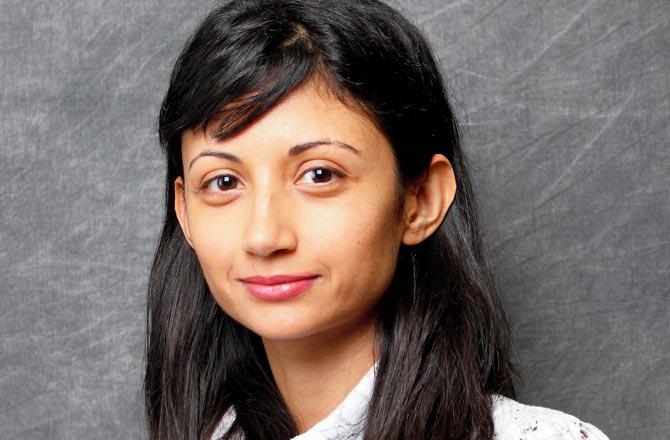
Archana Koirala
New South Wales (NSW) in Australia partially closed schools at the peak of the state's epidemic in March, but kept day-care centres open. Kristine Macartney, director of Australia's National Centre for Immunisation Research and Surveillance in Sydney, and her colleagues analysed data from schools and day-care centres from between late January and early April, which remained open for the children of healthcare workers or those with no alternatives.
Archana Koirala, co-author of this study, says, "NSW is the most populous state in Australia. It has 1.8 million people, who are either 18 or under. It has 3,100 schools and 1,40,000 staff members and 1.2 million students. Ever since the schools resumed in May, there has been 88 per cent attendance recorded."
Explaining the key measures the state implemented, Koirala adds, "We enforced wide public healthcare strategies such as travel ban to decrease population movement. Parents were not allowed on school premises, hygiene and cleaning were increased. In some settings, interactions between school groups were limited. For example, a higher primary school student was not allowed to talk to a lower primary school pupil. A few months later, we also implemented procedures around sports and music. So there were limitations on singing groups, and playing sport was allowed within local area only."
But, what really worked for them is a centralised system. "We set up a coordinated response between the ministry of health, ministry of education, the local public health unit, the school and us [the researchers]. When a case was identified, it triggered our public health response. The school was immediately shut for three days; during this period, the public health unit made a contact list to find who may have come in close contact with the infected person. Then, the ministry contacted everyone named in this list and ensured they were self quarantined for 14 days. If no additional case was identified, the school was reopened on the third day," Koirala adds.
Keep scrolling to read more news
Catch up on all the latest Mumbai news, crime news, current affairs, and a complete guide from food to things to do and events across Mumbai. Also download the new mid-day Android and iOS apps to get latest updates.
Mid-Day is now on Telegram. Click here to join our channel (@middayinfomedialtd) and stay updated with the latest news
 Subscribe today by clicking the link and stay updated with the latest news!" Click here!
Subscribe today by clicking the link and stay updated with the latest news!" Click here!







